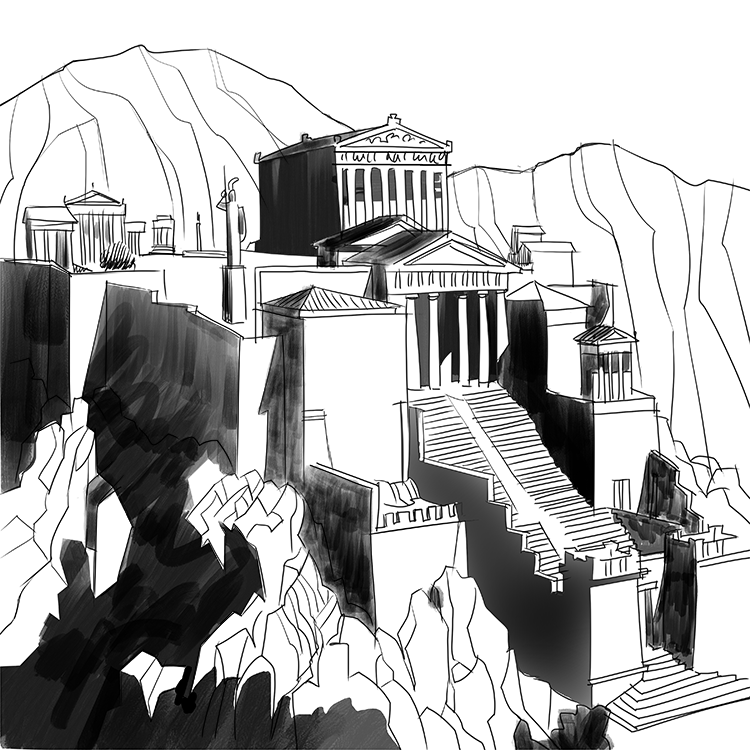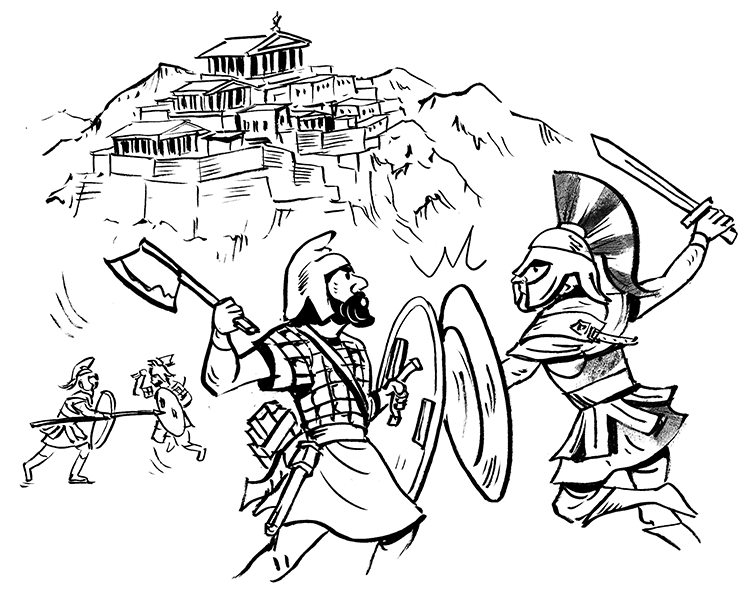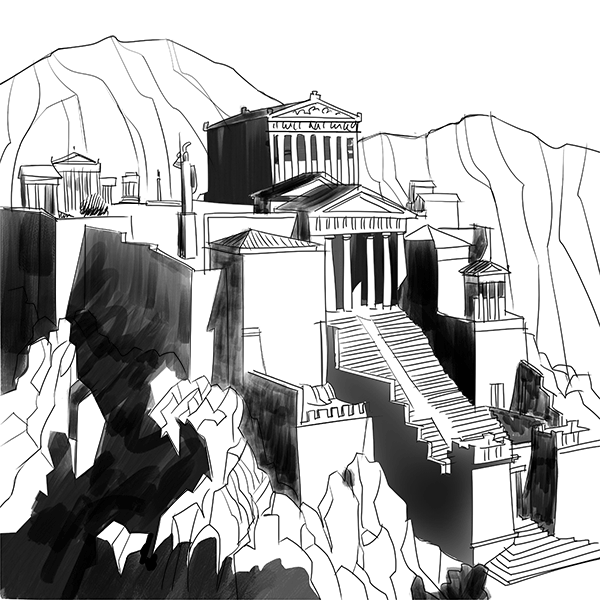When it comes to the world’s most famous ancient cities, the list pretty much begins and ends with Athens and Rome. Sure, Damascus is one of the oldest, and the Egyptians have their fair few.
But the Greeks and Romans basically built the modern Wwestern world.
Yet Athens is older, so maybe it wins?
In the end, there is no winner, but it’s impossible to understate the impact Athens has had on the growth and development of human civilization.
The Origins of Athens
Athens is one of the oldest inhabited cities in the world. Though it didn’t get its name until perhaps 1000 BC, people have been living there since the Neolithic Era. That started 12,000 years ago!
When we look at the geography of Athens, it’s somewhat surprising that people have been living there for so long. Located in the region of Attica on the southeastern tip of mainland Greece, the city is surrounded by mountains.
This helped make it easy to defend, but it also meant there was very little usable farmland. So, for most of Athenian history, the city had such a small population that it could barely be called a city.
All of this changed around 1000 BC. The population in and around Athens began to grow, and it soon became too big for its own good. This caused the Athenians – who were all Ionian Greeks, named after their specific dialect – to emigrate from Attica to other parts of Europe and Asia.
During these journeys, they settled on the Greek islands scattered through the Aegean Sea, the Italian coast, and what is now the Turkish coast, a region that in ancient times was known as Ionia.
All of this change meant that Athens was no longer just some small town. It was now a “major” city. Maybe not by modern terms. But in the ancient world, Athens was BIG.
Plus, it now had connections to the rest of the world.
The stage was set for Athens to become a true super power.

The Acropolis and the Agora
As Athens started to grow, it developed two features that still define it to this day: the Acropolis and the Agora.
The Acropolis was/is (you can still visit it today) a citadel that sat on top of a rocky hill just north of the main part of the city. It was where the Athenians built their temples and other important religious buildings, most notably the Parthenon. This was the temple built to Athena, the Greek goddess for which Athens is named.
Many cities had an acropolis; the word literally means “the highest point in the city.” But the Athenian Acropolis was such a big deal that when people say the Acropolis, everyone knows they’re talking about the one in Athens.
The Agora was the main city center and gathering place that was located to the northwest of the Acropolis. This is where most of daily Athenian life took place, mainly business and politics.
The majority of the people who lived “in” Athens actually lived on the surrounding land, and so when they wanted to do some business, they would come to the Agora. This was also where most of Greek political life took place. It wasn’t uncommon to show up there and hear people giving speeches or passing out pamphlets.
In this sense, the agora was the center of Athenian social and political life.

The World’s First Democracy?
One of the reasons Athens is so famous is because it is considered to be the birthplace of democracy. This may or may not be entirely true. But if nothing else, it’s one of the first known examples of democracy.
The Athenians practiced direct democracy, which meant that the entire voting population had a say in what laws and policies were passed. This is different from indirect democracy in which people elect representatives to voice their opinions for them.
This all sounds very progressive, but Athenian democracy excluded women, slaves, and foreigners, so it only included about 30 percent of the population. People today wouldn’t call that a democracy, but given the context of the ancient world, most are willing to give them a pass.
Athenian democracy was a completely different form of government that the world had never seen before, and many of today’s democracies are modelled after the Athenian version.
Part of the reason Athenian democracy is so famous is because of how long it lasted. First established in the 7th century BC, it didn’t fall until around 338 BC. This was when Macedon invaded and established its empire.
During this period of 300+ years, there were several moments where democracy’s future seemed doomed, but it always made a comeback. Until it didn’t. There’s a lesson there…perhaps.
This showed to the world that democracy can last if the people are committed to it continuing.

The Center of the World
Athens grew to be a powerful city not only in Greece but in the entire ancient world. One of the ways it did this was through trade.
Remember, there wasn’t a lot of farmland in Athens. In fact, there wasn’t much of any resource except marble and metals. Therefore, the Athenians had to rely on overseas trade for a lot of their stuff.
Much of this trade came from the colonies established by oher Ionians, but the Athenians also traded with Egypt, Persia, Phoenicia, and many other cultures in the region.
This helped turn Athens into a centerpiece of the ancient world.
To add to its reputation, Athens was also home to lots and lots of really smart people. Though many of them were born elsewhere, great minds such as Socrates, Plato, Aristotle, Aristophanes, and Sophocles all called Athens home. Their work in science, math, philosophy, and literature helped elevate Athens to become a cultural hotspot of the ancient world.
Athenian culture was so respected, and considered so important to Greece as a whole, that the Spartans refused to destroy the city after defeating Athens in the Peloponnesian War. This was a massive conflict between the two most powerful Greek city-states that dramatically impacted Greek and ancient history.
Normally, after such a conflict, the winner would unleash their rage on their enemies. But Sparta showed restraint.
That a sworn enemy resisted revenge speaks to the significance of Athens at the time. And this allowed Athens to maintain its position on the world stage despite its defeat, helping give rise to its legendary status.

The Delian League and the Athenian Empire
Around 500 BC, trouble came knocking at Greece’s door. The Greeks living in Ionia, which at the time was ruled by the Persians, decided to rebel against their rulers.
Athens, having a soft spot for their fellow Ionians, decided to support them. But this was a total failure. The Persians put down the rebellion and then immediately set out to punish Athens for their support.
Seeing the handwriting on the wall, Athens quickly scrambled to put together a defense, which meant calling on the rest of the Greek world, particularly their rivals the Spartans, for help. Athens stood no chance of stopping Persia all by itself.
Sparta initially resisted helping, but seeing that it was in their best interest to keep the Persians out, they wound up joining the defense. The Persians were pushed back at the infamous Battle of Marathon.
Ten years later, they tried again, this time with an even bigger and more dangerous army.
Once again, Athens called on its Greek brothers and sisters for help, and once again, the Spartans reluctantly agreed to join the fight.
After losing the Battle of Thermopylae, the Greeks once again beat back the Persians on their front door, winning the Battle of Plataea and ending the threat of Persian invasion.
Riding high from these victories, the Athenians built on their alliances and formed what became known as the Delian League. This confederation of Greek city-states that most certainly did not include Sparta then started expanding its influence to other parts of Greece and the ancient world. Eager to prove their worth, the Athenians began picking fights with both the Persians and the Egyptians.
After some time, they started to irritate the Spartans, and this initiated what became known as the Peloponnesian War. This face-off between Athens and Sparta lasted more than 30 years, with Sparta emerging victorious.
From this point on, Athens was never quite as powerful as it had been, though it remained an important cultural and commercial center in the ancient world. But just like so many cities throughout history, its ambition and desire for power drove it straight to the ground.
Fall to the Romans
After losing the Peloponnesian War, Athenian democracy was replaced by a pro-Spartan oligarchy (rule by the few).
Eventually, Sparta was also defeated, and this brought democracy back. But when Athens was forced to seek out the help of Rome to defend against the Macedonians, this pretty much ended Athenian democracy and independence.
Later, when Rome had grown powerful enough to declare itself an empire, Athens was made a provincial capital. But it was no longer the flourishing, independent city it once was.
This marks the end of Athens in the Classical Era of Greece, but the city has remained relevant to this day. Not only is it the capital of modern Greece, but it also still serves as an important trading hub between the East and the West.
There’s no telling what the future can bring, but if the past is any guide, Athens will be an important, powerful city for many, many years to come.
Written by Matthew Jones
Illustrated by Pablo Velarde Diaz-Pache
